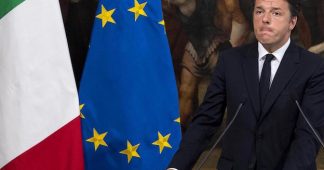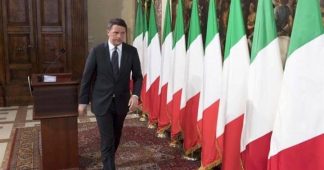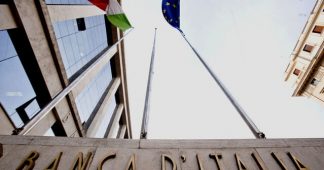The next general elections in Italy (due to be held on 4th March 2018) seem doomed to produce more than a surprise.
In the ongoing collapse of the entire Italian political system (all parties and coalitions are falling in the polls, while the only “party” that will be the absolute winner seems to be that of abstainers, or those who will not go to the polls), a new political movement has emerged, a list of independent citizens, outside the parties, who consider themselves “honest, competent, courageous”.
It is called, significantly, “The List of the People” and, in its constitutive call for participation, it has launched a resolute attack against all fabrications made by the mainstream media about the so called “populism” phenomenon.
Its main promoters are the journalist Giulietto Chiesa, director of Pandoratv.it and Antonio Ingroia, the well-known magistrate who became famous for his extraordinary commitment against the Sicilian Mafia.
This list has a peculiar and unprecedented feature: it declares itself a “stranger” to the historical left-to-right political ideologies , and “transversal” in the sense that its main purpose is not the unification of the left parties but only to bring together differently inspired forces, including important parts of the Catholic world, in defence of the Italian Constitution, whose writing was precisely the moment of convergence of all the anti-fascist forces of the country.
From its program, which we hereby propose to bring to European attention, a couple of crucial issues emerge: the necessity for implementation of the violated Constitution, the proclamation of Italian neutrality, namely its progressive exit from NATO, a line of radical revision of the current European physiognomy, denunciation of the Maastricht and Lisbon treaties as unconstitutional, rejection of the so called “Troika austerity policies” (as suicidal deceit) and, above all, in a situation where the “Cassa Depositi e Prestiti” (CDP) is the only predominantly public bank still operating in Italy (after the wild privatizations of the 90s) a step towards monetary sovereignty through launching of a complementary “Italian currency” in the form of Tax Credit Certificates.
The project, developed by a large group of high-profile economists, is essentially a “plan B”, which is perfectly compatible with the current European financial regulations, and should allow for investment of over 100 billion euros for job creation and economic growth, bypassing the “Brussels” obstacles that are dragging Italy into recession.
It is the same “plan B” that Tsipras and Varoufakis failed to deliver, and that the latter has not yet managed to formulate, three years after the beginning of the “Greek tragedy”.
The “List of the People” seems to have found the right key that can prevent Brussels from “closing ATMs” to anyone who wants to get out from the euro trap, without doing any harm to the masses.
Giullietto Chiesa
A “LIST OF THE PEOPLE”
TO IMPLEMENT THE CONSTITUTION
BECAUSE
1) the Italian Constitution is today unimplemented, contradicted in its inspiring principles and violated in many fundamental articles (all the political parties have wrought havoc, in league with the financial oligarchies)
2) on 4th December 2016 the great majority of the Italian people defended the democratic Constitution, and called for participation aimed at removing the obstacles to the realization of substantial equality and social justice and instead we will have to vote, once again, under an unconstitutional law launched with a scandalous coup by a parliament of nominated politicians.
Accordingly:
3) The “List of the People” is both a name and a political programme. We are not part of the hypocritical chorus of lamentations against “populism”. A revolt of the people is happening. It is sacrosanct and growing. Sovereignty has been damaged and must be restored.
4) The “List of the People” is addressed, in the name of national unity, to all the essential political, religious, cultural and moral components of the country, those which in fact have given life to the Constitution.
5) The “List of the people” is an alliance of civil society, not a party, made up of brave women and men – because changing this country will require courage – with different stories and backgrounds, not corrupted, but competent and honest. Those who support it solemnly agree to implement the programme presented here, while maintaining their own ideas when they remain outside the common programmatic understanding.
6) Restoring national sovereignty encompasses two necessary choices:
- a) Renegotiation and – if impracticable – unilateral withdrawal from the European Treaties that violate the Constitution (Art. 11 of the Constitution).
- b) Transformation of Italy into a neutral country, outside of every military block and at the service of peace, within the norms of the UN Charter, putting an end to the current status of a subordinate country, freed from atomic bombs on the basis of Nuclear Non-Proliferation Treaty, which it has ratified but which it does not respect. Italy has no enemies, does not want to impose sanctions and intends to stay out of war.
7) We are not anti-European. On the contrary, we want Italy to help create a European entity capable of playing a crucial role in a multipolar world in defence of peace. If isolated, the current European states will be overwhelmed by the action of the world giants, without being able to oppose resistance.We want a democratic Europe of the peoples. Any limitation of national sovereignty must be subordinated to the absolute and effective equality of all the contracting parties and in no case must it be carried out at the expense of the democratic guarantees provided by the Constitution. We need a new European Constitution to be submitted through popular referendums to the approval of the citizens, free in the full exercise of constitutional prerogatives and national sovereignty.
IMMEDIATE INTERVENTIONS
8) Transforming the “Cassa Depositi e Prestiti” (Treasury of Deposits and Loans) into a public bank, issuing a complementary fiscal currency and launching a three-year public investment plan of € 200 billion.
9) Emancipation from the dependence on financial markets, from the blackmail of public debt and rating agencies, and the introduction of rules that preclude any speculation and financial manipulation perpetrated by business banks.
10) Launch of the largest popular class action against rating agencies to claim compensation of € 120 billion, to be distributed pro-quota to the categories that will join.
11) Repeal of the norms that contradict the social function of private property and the general interest (Art. 42 of the Constitution); cancellation of laws that have led to social insecurity, such as art. 8 of the Sacconi law, the Fornero law, the Job Act, providing for the reintroduction of art. 18 of the Workers’ Statute. Implementation of a fair tax system and in defence of savings. Abolition of the balanced budget determined by the modification of art. 81 of the Constitution.
AN ECONOMY OF WELL-BEING
12) The model imposed by the Troika is based on two great lies: public debt and austerity, supported by politicians who are traitors of their own mandate and with the complicity of fictitious oppositions. This model is regulated by regulatory mechanisms such as the Fiscal Compact, the MES, the Bail-in, and aims to impoverish people by creating devaluation and unemployment.
13) This model is in clear violation of the Italian Constitution. In particular, it is incompatible with Articles 35-36 (dignity of work); 38 (cancelled, in fact, by the Fiscal Compact); 41 (not implementable due to the loss of the government of the economy by the national executives); 42 (because the rules of Trojka prevent the protection of public property); 47 (because credit control is exercised by private entities rather than by the Republic).
14) To this model we oppose an economy of social welfare, based on the popular control of credit, on the use of money for the benefit of productive enterprises (and not of bank bailouts), in order to promote the well being of the population, also through the reacquisition of control of strategic sectors and essential public services.
A NEW SOCIAL AND CIVIL PACT
15) We intend to start a radical reform of Justice, restoring legal certainty for the over 11 million citizens who suffer from inadmissible delays in the closing of trials.We need the full application of the confiscation of assets of the mafia, but also of corrupt politicians, by introducing a La Torre-bis Law and, more generally, by strengthening the tools against mafia and corruption. The prison system must be reformed, making it more humane and effective, as well as strengthening alternative forms of conflict settlement in the civil and criminal matters.
16) Work is everyone’s right and public solidarity must be translated into programs for full employment of women and men workers, in conditions of equal opportunity and dignity, in order to promote the harmonious development of the person.
17) Extremely high and unsustainable migratory flows are the result of a global economic and social, authoritarian and technocratic process. The solution to this problem can only be successful as a result of overcoming the neoliberal model that destroys resources and crushes work.
18) Health is everyone’s right and public health structures must not be managed as profit-oriented enterprises.
19) Everyone should have access to the education system, as well as a source of growth of the formidable reserve of the cultural capital of the country. It is a place, like the family, from where to start the radical reversal of the degenerative processes that depress the intellectual and moral tenor of the population.
20) The environment is a public good and water cannot be privatised.
21) Information and communication must be at the service of citizens. Democracy cannot exist if citizens are not properly and correctly informed. There can be no correct information if the vast majority of the media system is enslaved by the interests of advertisers. The Communications Authority must be elected with the greatest possible participation by consumers and users, and will have to manage radio and television frequencies and mobile phones as public goods.
22) The arts and the sciences must not be conditioned by the demands of the market.
23) The digital revolution is producing enormous and accelerated changes in collective life, involving all spheres of human activity and changing social relationships (big data, new energies, bio-genetics, etc.). These processes must be governed in the collective interest, according to the Constitution.
Le prossime elezioni politiche in Italia (si voterà il 4 marzo prossimo) sembrano destinate a produrre più di una sorpresa. Il collasso dell’intero sistema politico italiano (tutti i partiti e le coalizioni stanno scendendo nei sondaggi, mentre l’unico “partito” che sarà il vincitore assoluto è quello degli astenuti, o di coloro che non andranno a votare) appare un nuovo agglomerato politico, emerge una lista di cittadini indipendenti, fuori dai partiti, che si considerano “onesti, competenti, coraggiosi”. Si chiama, significativamente, “Lista del Popolo” e, nel suo appello costitutivo, sferra un attacco risoluto contro tutte le chiacchiere del mainstream a proposito del “populismo”. I suoi promotori principali sono il giornalista Giulietto Chiesa, direttore di Pandoratv.it e Antonio Ingroia, il notissimo magistrato divenuto famoso per il suo straordinario impegno contro la mafia siciliana. Ma la lista ha una caratteristica peculiare e inedita: si dichiara estranea alle contrapposizioni storiche destra-sinistra, e “trasversale” nel senso che non si pone come obiettivo l’”unificazione delle sinistre”, ma che raduna forze di ispirazione diversa, tra cui parti importanti del mondo cattolico, nello spirito della Costituzione italiana, che fu appunto momento di convergenza di tutte le forze antifasciste del paese. Dal suo programma, che qui proponiamo all’attenzione europea, emergono due temi fondamentali: la necessità della attuazione della Costituzione violata, la proclamazione della neutralità dell’Italia, cioè la sua prograssiva uscita dalla Nato, una linea di radicale revisione della fisionomia europea attuale, la denuncia dei trattati di Maastricht e di Lisbona (in quanto anticostituzionali) il rifiuto dell’austerità della Trojka (come inganno suicida) e, soprattutto, un passo verso la sovranità monetaria che vede la Cassa Depositi e Prestiti (CDP) — unica banca ancora prevalentemente pubblica rimasta in Italia dopo le privatizzazioni selvagge degli anni ’90 — come strumento per varare una moneta complementare “italiana” sotto forma di Certificati di Credito Fiscale. Il progetto, elaborato da un nutrito gruppo di economisti di grande valore, è in sostanza un “piano B”, che si presenta come perfettamente compatibile con le attuali normative finanziarie europee, e che consentirebbe un investimento di oltre 100 miliardi di euro per il lavoro e lo sviluppo, aggirando gli ostacoli “bruxellesi” che stanno trascinando l’Italia nella recessione. È il “piano B” che mancò a Tsipras e Varoufakis, e che quest’ultimo non è ancora riuscito a formulare a tre anni dall’inizio della “tragedia greca”.
La Lista del Popolo sembra aver trovato la chiave che può impedire a Bruxelles di “chiudere i bancomat a chiunque vuole uscire, senza danni per le masse popolari, dalla trappola dell’euro.











